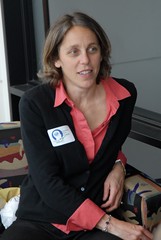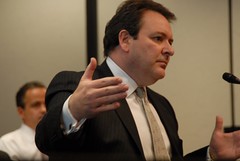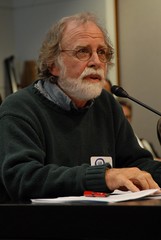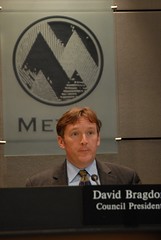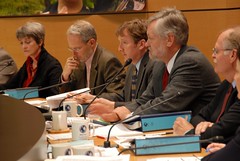[NOTE: Read the comments below this article for thoughts and perspectives from readers that attended the hearing.]
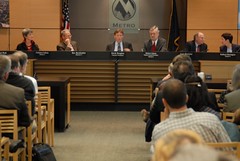
an important hearing on the CRC project.
(Photos © J. Maus)
A packed crowd has assembled at Metro Headquarters in northeast Portland for a public hearing on the Columbia River Crossing project.
Over 60 people have signed up to speak and extra chairs have been brought out to accommodate everyone. Faces in the crowd include Coalition for Livable Future’s Jill Fugilister, notable critic of the project Ron Buel (he’s the guy that wants to bury the I-5 freeway), veteran transportation activist Jim Howell (he played a role in the defeat of the Mt. Hood Freeway), former City Council candidate Chris Smith, and others.
On the agenda are several resolutions that will help shape Metro’s position on the controversial, $4.2 billion project. But before any vote can happen, the Council has to listen to well over 60 people that have signed up to share their views (it’s going to be a very long meeting — the first break isn’t scheduled until 5:00).
Rex Burkholder introduced the issue, giving us a history of the project, listing the problems the project hopes to solve (the usual litany of congestion, safety, lack of transit, etc…) and re-iterating his support for the process thus far. Burkholder — Metro’s representative on the 39-member CRC Task Force — reminded the crowd that they were assembled today not to vote on a Locally Preferred Alternative, but, “what we’re voting on today is… to give me direction on what this body [Metro Council] believes is the most effective solution to those problems.”
First to speak up was Oregon Department of Transportation director Matt Garrett. Garrett, in his usual bureaucratic style, talked glowingly about how the CRC is about partnerships and opportunities, and that “if we don’t take advantage of the partnerships we’ll never grasp the opportunities.”
Once he was finished, Metro Councilor Robert Liberty — an outspoken critic of the project — asked Garrett about how the project will be funded, saying, “Given the demands on [funding] resources, it’s going to be pressing on my mind where those funds will come from.” Garrett admitted that the funding picture is not clear yet, but that he believes, “it is important that we turn on as many financial spigots as possible for this project… that’s how important I think this is.”
The first few speakers included the director of the Portland Expo Center who has concerns about how proposed interchange redesigns might impact their business.
Swan Island transportation expert and critic of the project Lenny Anderson, said he supports the three Metro Councilors who proposed a resolution calling for implementing tolls on the existing bridge before moving forward. Anderson added that ODOT’s Garrett routinely “overstates the need and understates the impact” of the project.
Pointing out that the the proposal in the works “doubles the number of lanes for auto traffic” on the bridge, Anderson said, “I do not want us to be remembered for putting forth a project with the largest vehicle capacity increase in decades… that’s not a legacy we can be proud of.”
Chris Smith, a transportation activist who just wrapped up a run at Portland City Council, opened his testimony by saying, “Often the answer you get depends on how you ask the question.” Smith said asking how to relieve congestion is important, but that there are other important questions we should ask, such as: “Should we look at tolling as the primary question and then base how we go forward from that? What does this project do to land-use in our region? What does this project mean in a post peak-oil world?”
Smith’s most memorable question was, “At what price of oil does this project stop making sense?” He ended his testimony with, “I am deeply concerned that none of the options before us represent the best choice for our region.”
A representative from Schnitzer Steel spoke in support of the project (favoring a replacement bridge with light rail.). He said the project was important to area shippers and that his company takes 900 truckloads per month and 45 trucks per day over the existing spans. “Time delays on the bridge [due to congestion],” he said, “have a direct and tangible impact on our bottom line.”
I’m going to head back into Council Chambers and see what’s going on (there’s no wi-fi from inside, so I might try posting from my phone).
_____________
UPDATES:
— It’s confusing to follow all the twists and turns in this process and especially here at Metro, where several resolutions and myriad amendments are on the table (literally, on a table as you walk in). I want to try and clarify a few things. First, the resolution in opposition to the project put forth by Councilors Liberty, Hosticka, and Collette does not have a fourth vote and is not expected to move forward.
Council President David Bragdon has an interesting resolution on the table. It recognizes that Metro will instruct its “delegate” (Rex Burkholder) to endorse the replacement bridge, light rail and tolls as specified in the Draft EIS. But it goes on to say that “Metro Council simultaneously finds that the following issues will need to be satisfactorily addressed in the upcoming refinement of design, engineering and financial planning.”
The Bragdon resolution goes on to say that:
“The Governors of the two states are respectfully requested to convene a Local Oversight Committee consisting of the following local agencies to make all major planning, design, engineering, finance and construction decisions in partnership with the two state governments.”
The “local agencies” that would make up this committee are the cities of Vancouver and Portland, the Metro Council, the Regional Transportation Council (Washington’s version of Metro), and C-Tran and TriMet (the Vancouver and Portland mass transit authorities.)
The decisions to be made by this six-party committee would “include but would not be limited to”:
-
— Number of total lanes
— Size and design of the bicycle and pedestrian facilities
— Design of the light rail transit facility
This is essentially an attempt to remove the Washington and Oregon Departments of Transportation from having such major influence over many aspects of the project (which explains while ODOT director Matt Garrett is still here after 90% of the crowd has left).
===
— I had to leave the hearing at about 6:45 while the Council was debating and discussing the various amendments. Here is a final update from reader John Reinhold who stayed until the end:
“Metro voted to recommend a new bridge, with a few ammendments which ask for some better numbers and details than we have been given thus far.
The vote was 5 to 2 in favor. 3938B passed with amendments.
This is only a vote to provide guidance for Rex Burkhokder when he goes back to the CRC task force to work on selecting the Locally Preferred Alternative (LPA).
This action does not actually officially approve any bridge option.
The actual votes on the LPA [locally preferred alternative] will be later this summer. Those are the actual votes with teeth.
However, this can be an indicator that expensive bridge opponents have a hard fight ahead. The CRC is a battleship that may not be able to reverse its course.”
That’s it for tonight, I might do a wrap-up story with some added thoughts and photos tomorrow.


